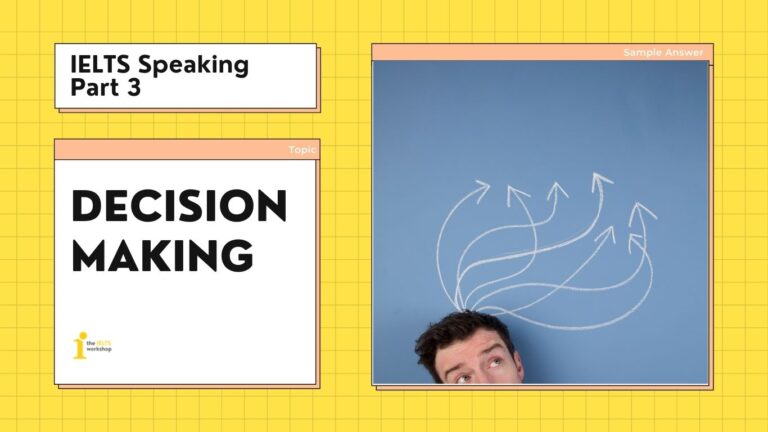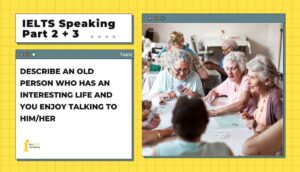Trong chuyên mục giải đề IELTS Speaking lần này, cô Thuỷ Tiên của The IELTS Workshop sẽ hướng dẫn cách trả lời câu hỏi của một chủ đề trong Decision IELTS Speaking Part 3. Cùng tham khảo sample, từ vựng theo chủ đề và một vài cách diễn đạt ghi điểm nhé.
Câu hỏi cho chủ đề Decision IELTS Speaking Part 3
What decisions do people usually make in their daily lives? (Con người thường phải đưa ra những quyết định gì trong cuộc sống?)
Which is easier, making a decision by yourself or making a decision after group discussion? (Điều gì dễ hơn, tự đưa ra quyết định hay quyết định sau khi thảo luận với nhóm?)
Why are many young people unwilling to follow their parents’ advice? (Vì sao nhiều người không muốn nghe lời bố mẹ mình?)
Why would middle-aged people tend to second-guess their own decisions? (Vì sao nhiều người trung niên thường hay phân vân khi đưa ra quyết định?)
Câu trả lời mẫu (Sample Answer)
1. What decisions do people usually make in their daily lives?
I reckon that on a daily basis, our human brains usually have to conduct a myriad of decisions, sometimes, even unconsciously. They can revolve around simple things like balanced diets for family or what genre of music they would listen to relieve stress. In some other cases, they can be more perplexing like choosing a career or a life partner.
- a myriad of (n) một loạt
- revolve around (v) phân vân
- perplexing (adj) phân vân
2. Which is easier, making a decision by yourself or making a decision after group discussion?
From my own experience, the former way seems to be faster while the latter one tends to be wiser because different angles of the issue can be examined and taken into consideration.
- take (smth) into consideration: suy nghĩ kĩ về cái gì
3. Why are many young people unwilling to follow their parents’ advice?
For this very common familial phenomenon, I guess the root usually comes from both sides. In many cases, parents appear to be repressive and ignore the personal opinions and wishes of children, the ones they think are still far from maturity. In contrast, the young can overly gravitate toward the desire to prove their independence and forget that they also should listen to the advice from others.
- be far from sth (v) xa rời khỏi
- repressive (a) áp chế
- gravitate toward (v) nghiêng về, có xu hướng
4. Why would middle-aged people tend to second-guess their own decisions?
I haven’t ever heard about this tendency among this group of people because people in their middle age normally already understood pretty clearly the fact that there are no right or wrong answers for a situation. The conundrum over whether their decision in the past was justifiable or not doesn’t really bother them much. But if there’s someone like that, I guess they lack experience of trust in themselves.
- conundrum (n) câu hỏi hóc búa
Bài mẫu bởi cô Thuỷ Tiên – Giáo viên tại The IELTS Workshop HN
Tạm kết
Trên đây là sample cho Topic: Decision IELTS Speaking Part 3. Bạn cũng có thể truy cập Kho bài mẫu Speaking của TIW để tham khảo nhiều sample answer cho các chủ đề IELTS khác ngoài Patience IELTS Speaking Part 3 nhé.
Để học cách xây dựng câu trả lời hoàn chỉnh cho phần thi IELTS Speaking, bạn có thể tham khảo khóa học IELTS Senior của The IELTS Workshop.









